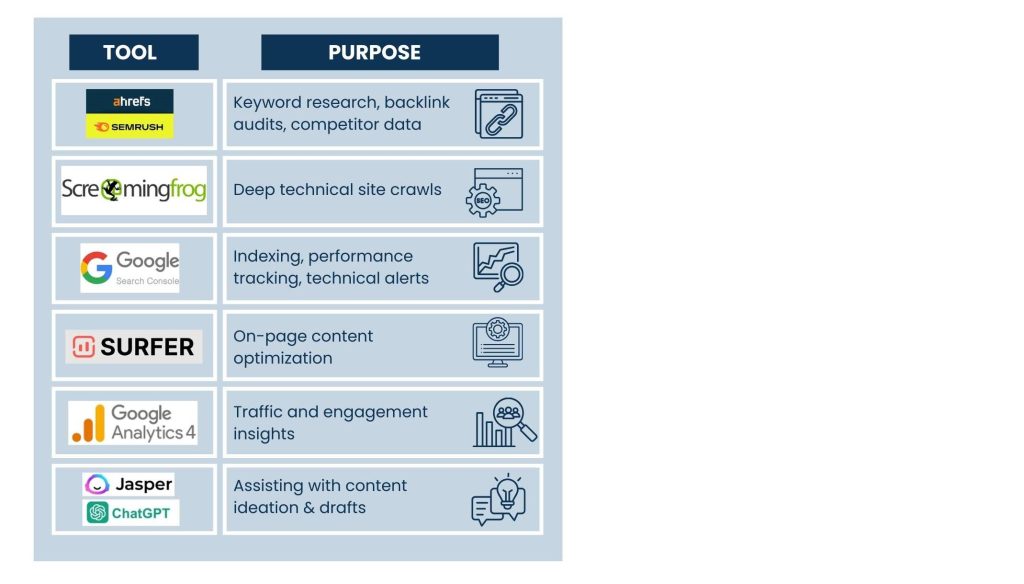Introduction
SEO is one of those things that’s always “dying” — until it’s what drives your best-performing traffic. The truth? Search engine optimization in 2025 is as alive as ever — but it’s also more competitive, technical, and strategic than you might remember.
This is where a good SEO Account Manager comes in.
This isn’t someone randomly drafting keywords into a blog post or throwing out a few backlinks. An outstanding SEO Account Manager is part strategist, analyst, project lead, and communicator. Their job? So you know what your business is doing (and what it’s not doing), you can extract SEO from it, and it converts into measurable growth, time after time.
Let’s dissect what they do, how they create campaigns that rank, and what the secret to winning in today’s search landscape is.
The Role of an SEO Account Manager
They are not just checking the standings. They are running full-scale campaigns grounded in research, collaboration, and technical knowledge. This role serves as the link between the SEO team and the client or stakeholders internally. They interpret performance data and turn it into strategy. And best of all, they own the results.

Here’s what the job usually entails:
Strategy Building Every campaign needs a plan. The SEO Account Manager establishes the roadmap and aligns search opportunities with business objectives. They help decide what to put the most focus on — whether it be technical SEO, content, etc — and how this all aligns with a single, measurable outcome that the entire strategy serves.
1. SEO for project management isn’t a solo act:
The manager makes sure everything keeps moving, interacting between copywriters, developers, designers, and sometimes paid media teams. They oversee timelines, delegate work, and ensure every piece of the campaign is tethered to the broader vision.
2. Client Communication:
Whether you’re dealing with an agency client or an internal team, the most important thing is communication. The SEO Account Manager explains and answers questions and provides updates while keeping everyone else informed — translating specialized SEO work into meaningful, actionable, and understandable groups of insights that promote trust and buy-in.
3. Performance Tracking:
You must keep an eye on what’s working (and what’s not). For the manager, monitoring keyword rankings, organic traffic, bounce rates, and conversions is second nature. If something drops or jumps, they investigate immediately and adjust strategy accordingly.”
In short, the SEO Account Manager is the person who is responsible for ensuring the campaign runs from point A to point B as smoothly and successfully as possible—strategically, technically, and on a relationship level.
Creating a Campaign from Scratch: The Process
There is no luck in winning SEO campaigns, they are built. They’re structured — step by step — with a framework that can be repeated and adjusted to each company. So, what do the best SEO Account Managers do first?

1. Get an Understanding of the Business & Goals:
They roll their sleeves up into the business before even touching a keyword. What is the product or service? Who’s the ideal customer? What is success — more leads, more local exposure, more sign-ups? It’s all about aligning SEO to business results.
2. Competitor & Market Research:
This is where you begin to find opportunities. Using tools like Ahrefs, SEMrush, or SimilarWeb, the SEO manager finds out what competitors are ranking for, how their site is structured, and where the gaps are. It’s less about imitation, more about angles to outsmart.
3. Keyword Mapping:
The next step is to match the right keywords with the right pages. It’s not a matter of volume — it’s a matter of intention. What is someone searching for when they feel ready to buy? What is the difference between top-of-funnel and bottom-of-funnel? Every keyword has a job, and it requires a house.
4. Technical SEO Audit:
When developing on a site, you have to first ensure the foundation is stable. An audit looks for speed problems, crawl errors, broken links, mobile-friendliness, etc. Addressing these issues early will save you from bigger problems later on.
5. Organizing Your Site and Mapping Out Content:
After keywords & technical health are sorted, you start mapping out the structure: pillar & core pages, blog categories, internal linking opportunities, etc. Good SEO Account Managers do not only optimize what exists — they strategize what needs to exist.
6. Setting KPIs & Timeline:
You can’t fix what you don’t know about. The manager defines measurable goals: increase traffic, higher keyword ranking, lower bounce rate, and higher conversions. They also establish a timeline, balancing quick wins against long-term goals.
Also Read: Virtual Assistant Services in Nitra
Executing with Precision: The Campaign in Motion
Once the strategy is outlined, the SEO Account Manager launches into action mode. This is where all that planning results in actual outcomes. A great SEO plan means nothing if it’s not carried out regularly, and that’s where an excellent manager comes in.

Here’s what the execution of a campaign usually looks like:
1. Content Creation Strategy:
Content is still king — but only if it’s relevant and quality. The manager specifies what needs to be created (blogs, landing pages, service pages, etc.), defines the search intent behind each, and handles quality assurance with writers to ensure everything is optimized and a valuable read.
2. On-Page Optimization:
Every page should speak Google’s language. These are meta titles, meta descriptions, headers, image alt text, internal linking, and content structure. The good SEO Account Manager makes sure you have these boxes ticked before publishing anything, creating optimization checklists for teams to follow along the way.
3. Technical Fixes:
SEO is technical under the hood, literally. This manager collaborates with developers to address various issues, including site speed, schema markup, crawl errors, and indexation problems. If you’re a beginner in the optimization space, they also ensure the site is mobile-optimized and secure, two big ranking factors in 2025.
4. Backlink Outreach:
On-page SEO remains important. Links from high-authority and relevant sites build trust and rankings. The SEO Account Manager develops outreach strategies, identifies potential link partners, and may even manage guest posting, digital PR, or broken link campaigns.
5. Local SEO (if relevant):
If you provide services or products to local customers, local SEO is essential. They keep Google Business Profiles up-to-date, watch for citation consistency, and drop local keywords throughout the site and content.
6. Reporting & Communication:
Clients and stakeholders should stay informed because SEO takes time. Professional SEO Account Managers put together trustworthy monthly reports with clear insights, not just numbers. They guide clients through performance, why things are working, and what comes next.
What SEO Account Managers and Professionals Avoid Doing
Good SEO isn’t only about doing the right things — it’s also about not doing the wrong ones.

As seasoned SEO Account Managers, here are some of the mistakes we avoid:
- Optimizing for keywords rather than search intent: If your content doesn’t reflect what the user is looking for, you can rank #1 and still get zero clicks.
- Over-optimizing pages, Keyword stuffing, unnatural anchor text, and spammy tactics don’t fly — and they can backfire on rankings.
- Neglecting technical SEO If your site is slow loading, doesn’t work on mobile, or obstructs search engine crawlers, even the best content won’t rank.
- Failing to update old content: SEO isn’t something to “set and forget.” Good managers routinely audit and refresh e-waste to ensure competitiveness.
- Not conveying SEO is a slow burn: When you don’t report progress, clients lose trust. If you’re not clear, regular updates are key.
Tools of the Trade
A modern SEO Account Manager uses a combination of tools to operate as efficiently as possible. These are not just niceties — these are critical components for tracking, auditing, and optimizing.

The tools are important — but the person using them is what really matters. A great SEO Account Manager knows which tools to use, when, and how to extract the insights that drive action.
Why You Need to Communicate More with Your Clients
If the message isn’t getting through, even the most technically sound campaign is doomed to fail. Great SEO Account Managers don’t just achieve results — they achieve clarity, consistency, and confidence.
Clients or stakeholders may not always understand SEO, and they shouldn’t have to. That’s the manager’s job, to explain what’s going on, why it matters, and how it relates to business goals — in terms the people around them can understand.

How to communicate well:
1. Reports once a month with real insights, not dashboards:
Anyone can run a chart out of Google Analytics, but the client wants to know what it means. A good report connects the dots between traffic, conversions, and business outcomes — not just what changed (and when) but why it matters and what’s next.
2. Email check-ins or video walkthroughs on key updates:
Quick regular check-ins are a signal that the campaign is alive and locomotive. A small video or short email summary can help clients feel all looped in without having lengthy calls.
3. Timely alerts before rankings move, Google updates happen, or technical issues arise:
Rather than waiting for a client to spot a dip, a great SEO Account Manager takes the initiative. Page deindexed? A Google algorithm update? They report back to the client quickly — and with a solution.
4. Setting expectations:
Reminding clients that SEO is a long game, not quick fixes; SEO takes a long time. Establishing realistic timelines and benchmarks early helps minimize any confusion and frustration later on. It’s worse to create a false sense of urgency than to underpromise and overdeliver.
And strong SEO managers don’t hide from jargon. They earn trust by acting with transparency, responsiveness, and honesty — even when results take time.
Also Read: Virtual Assistant Services in Prešov
The Importance of Delegation in SEO Campaigns
Here’s the hard truth: no SEO Account Manager can (or should) do it also by themselves. There are many moving parts to a winning campaign — research, content, outreach, technical fixes, reporting — and attempting to do everything by yourself is a prescription for burnout and a lack of progress.
Sufficient delegation speeds campaigns up and makes them run more smoothly. It frees the manager to concentrate on the work that matters.

Delegable (or at least delegable pending the right training) do’s:
1. Keyword research and clustering:
This is a fundamental task, but it takes a lot of time. If you do have a trained assistant, they can use SEO tools to pull keyword lists and group them by intent and prep for content mapping — hours saved every week.
2. Competitor tracking:
Monitoring competitors is one of the most important tasks to keep you on your toes. A VA can monitor how competitors are gaining or losing ground and what content and links they are adding to their profiles and provide you with periodic digests so you won’t have to do the digging.
3. Outreach management for link building:
Link building is not easy. When looking for outreach, you need to follow up, track, and personalize. It frees up your time to strategize and relationship-build while keeping your communication steady.
4. Formatting and publishing content:
Time spent on uploading content, optimizing formatting, and filling up meta details. A VA can manage all of that in WordPress or your CMS for you and make sure everything goes live nicely.
5. Monthly reporting and dashboard prep:
It’s a pain getting data from disparate platforms. A virtual assistant can aggregate reports from Google Analytics, Search Console, Ahrefs, etc. — ready for you to review.
6. Site audit documentation:
Once you have conducted a technical audit, organizing the issues into action plans is very important. If we have the discipline to hand off this work, it keeps the task clean for devs, content writers, or the client.
Delegation allows the manager to work on the high-impact stuff: strategy, communication, and decision-making. Team support — and that support extends beyond the workplace. Whether you’re part of a large team or flying solo, you need support.
Conclusion
In 2025, the role of the SEO Account Manager is more critical — and more complex — than ever. It’s no longer a matter of simply reaching page one. It’s about bringing the right traffic, converting that traffic, and ensuring every single SEO action aligns with a broader business goal.
You have to be strategic, organized, communicative, and focused. But you also need your support systems right — tools, teammates, and assistants who’ve got your back behind the scenes.
There is no accident in building winning campaigns. There’s someone at the top who knows what they’re doing — and has the right people in place to help them get it done.
About Us
Tasks Expert offers top-tier virtual assistant services from highly skilled professionals based in India. Our VAs handle a wide range of tasks, from part time personal assistant to specialized services like remote it support services, professional bookkeeping service etc. Furthermore, it helps businesses worldwide streamline operations and boost productivity.
Ready to elevate your business? Book a Call and let Tasks Expert take care of the rest.









